As my regular readers already know, I’m in the process of writing my next book. It’s a book about why security exists: specifically, how a group of people protects itself from individuals within that group. My working title has been The Dishonest Minority. The idea behind the title is that “honesty” is defined by social convention, then those that don’t follow the social conventions are by definition dishonest.
In my second blog post about the book, there was a lot of commentary about the word “dishonest.” The problem is that there are two kinds of dishonest people: those who are selfish, and those who are differently moral than the rest of society. So the word has to apply to both burglars and abolitionists. It has to apply to a criminal within society as a whole, and a police informant within a society of criminals. It has to apply to people who don’t pay their taxes because they’re selfish, and those who don’t pay because they are morally opposed to what the government is doing with the money. It has to apply to both Bernie Madoff and Gandhi.
It’s true that it’s a bit pejorative to use the word “dishonest” to describe both Madoff and Gandhi. But I can’t think of a better word. Here are some options:
- The Dishonest Minority
- The Dangerous Minority
- The Deviant Minority
- The Disobedient Minority
I don’t really like any of them.
Another option is to explicitly call out the two different types:
- Murderers, Messiahs, and Other Dangerous People
- Sinners, Saints, and Other Dangerous People
- Sociopaths, Saints, and Other Dangerous People
- Criminals, Revolutionaries, and Other Dangerous People
- Criminals, Activists, and Other Dangerous People
- Madoff, Gandhi, and Other Dangerous People
- Jesus, the Two Thieves, and other Dangerous People
- Liars, Outliers, and Other Threats
- Crime, Revolution, and Other Dangers
Alliteration is always a plus. Biblical references I’m less sure about.
I like this general concept for title, because the potential reader will be intrigued how the two are related. They’re both “transgressors,” which might be a good word for the title.
- Criminals, Revolutionaries, and Other Transgressors
- Sociopaths, Saints, and Other Transgressors
- Crime, Activism, and Other Transgressions
- Murder, Revolution, and Other Transgressions
Or the word alone:
- Transgressors
- Transgressions
The subtitle is still one of these:
- Security and its Role in Modern Society
- Security and its Role in Protecting Modern Society
- Security and its Role in Defending Modern Society
- Security and its Role in Defending Society
- Security and its Role in Protecting Society
Other options:
- Protecting Society through Security
- Securing Society from its Deviants
In general, I like an exciting title paired with a descriptive subtitle. But I’m willing to be convinced otherwise.
Remember, the goal of a title is to make people—people who don’t already know me and my writing—want to read my book.
Question 1: What do you think of the title options? What other words would work, either in the “adjective noun” title style, or the “A, B, and other Cs” style? What other completely different titles or subtitles would work?
Next: cover options. I’m not sure how much book cover matters anymore, now that my books will primarily be sold from online stores and in ebook formats. But I’d like a cover that doesn’t suck. And it’s hard. “Security” is a concept that’s full of trite metaphors. And it’s hard to come up with a picture that really captures what I am writing about. (Maybe this one.) Below are five options that my publisher has sent me.
1. 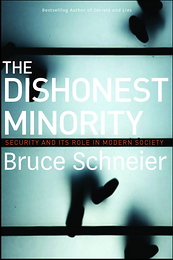 2.
2. 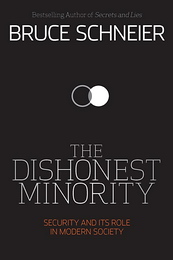 3.
3. 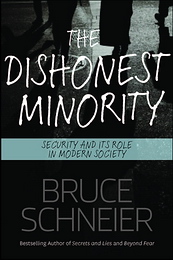 4.
4. 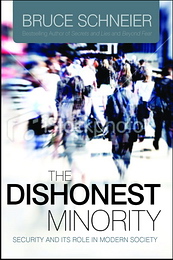 5.
5. 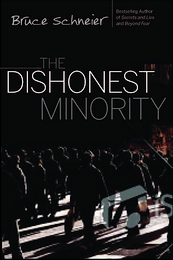
Note that the stock photos sometimes have watermarks, or are shown in artificially reduced resolution. If we actually use one of the photos, those artifacts will disappear.
Question 2: What do you think of the cover options: the stock photos, the typefaces, the colors, the overall layout of the cover? Will any of those work, or do we have to go back to the drawing board?
I appreciate your opinions. Please first give them to me cold, without reading the other comments. Then feel free to comment on what other people think.
Posted on June 21, 2011 at 11:20 AM •
View Comments





